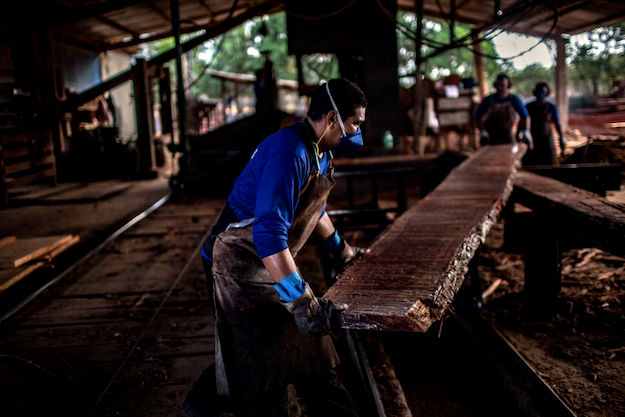At a meeting in Santiago last weekend, Brazil’s President Jair Bolsonaro thanked his Chilean counterpart, Sebastián Piñera, for agreeing to host this year’s UN climate conference, known as COP 25.
Brazil had been set to host the conference, but pulled out shortly after Bolsonaro was elected president in October. Bolsonaro said this weekend that Brazil “does not owe the world anything” when it comes to the environment, and that his government would put economic development above environmental concerns.
So, does Brazil’s new president have a point?
AQ sat down with Izabella Teixeira, a former environment minister who now studies climate change at the Brazilian Center for International Relations (CEBRI), to find out.
Teixeira started her career helping set up Brazil’s first ministry for the environment in 1985. In response to Bolsonaro’s comments, she said that thinking of the environment as an impediment to economic growth is “naïve,” and that for Brazil, environmental management should be thought of as a tool for growth. The following interview has been edited for clarity and length.
AQ: Can we reconcile economic development with environmental concerns?
Isabella Teixeira: The environment is no longer just an issue for environmentalists. It is an issue for everyone. If in the past century it was seen as taking care of nature, in the 21st century it is a pre-condition for development. If you don’t manage the environment, you won’t have your natural resources and you won’t have economic growth, period. Public policy will have to increasingly look at what science is telling us. The world is changing, and not only geopolitically.
The environment has become a strategic issue, because if you don’t develop sustainable ways of production, there won’t be production at all. Economic sectors today are looking at their vulnerabilities: How are we going to produce in the next 30 years? How will my business be affected? These discussions are happening around the world. Look at investment funds and compare them with a few years back. The search for sustainable investments is growing, and fast.
AQ: Agroindustry and mining are vital for Brazil’s economy. There seems to be an understanding that these sectors would be affected negatively under rules prioritizing environmental protection.
Teixeira: I think the discussion in Brazil needs to be more mature, not only from the political perspective, but also from an economic one. Brazil is a strategic country not only because we have natural resources, but because we can be competitive on the basis of our resource wealth.
But things don’t happen overnight. Our agricultural sector took 40 years to become what it is today: a competitive, leading business. Now we need to look at the next 40 years. Where do we want to go? What is the role of biotechnology, of innovation? This is what we need to be discussing. Using banned pesticides may help a small, antiquated sector, but it degrades the soil and poisons the water, endangering future productivity. Deforesting won’t help either. Embrapa (a governmental research institute) says the productive soil that we have in our country is mostly being used. If we are going to produce food for India, China, and the U.S., we need to do so sustainably in order to do so competitivily.
The same goes for mining, where we have the second largest industry in the world. But while Brazil has a state-of-the-art, global reference point in the Carajas mine, it also has Brumadinho. The question now is, can Brazil be the largest tropical agricultural producer in the world in the next 40 years without degrading the environment?
AQ: What about the Amazon and its population? Can their quest for development and jobs be reconciled with preservation?
Teixeira: You can’t discuss Brazil’s development without discussing the Amazon. It is more than 50 percent of Brazil’s territory, with 25 million people living in urban areas. This is more than many countries. We have learned over the last 30 years that you need to protect the forest because it regulates weather and the water supply and is vital for agriculture. If we waste this asset it will cost a lot of money to rebuild.
But we also learned that in a democracy you need to discuss everything, and that includes trying to find the best ways to solve the infrastructure problem.
If we want to use the Amazon to help develop the country, local products need to be able to get out and distributed. But today more than 85 percent of deforestation is illegal and does not generate wealth for the country. Something has to give. Strategic forest management and responsible mining can help us use the Amazon in a rational, sustainable way. It can be done. But the model we have today is a predatory one, substituting the forest for degraded areas and financed by environmental crimes, illegal gold mining and animal trafficking.
Developed countries look at Brazil and understand its environmental importance. They urge us to protect what we have, lest it cost us a fortune to restore and rebuild. Today, environmental protection is a development asset – and the countries that understand that will develop faster than those that don’t.
—
Tornaghi is the managing editor at AQ







